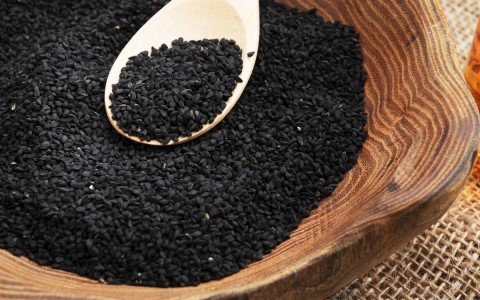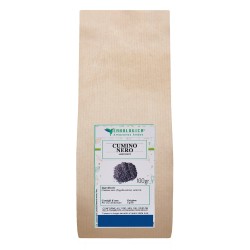
Cumino nero nigella sativa
Storia e Origini
La Nigella Sativa, o cumino nero, vanta una storia ricca e variegata, radicata nelle tradizioni di antiche civiltà.
Originaria dell'Asia Sudoccidentale, questa pianta è stata coltivata e valorizzata in Egitto, Medio Oriente, e in alcune parti dell'Europa per oltre duemila anni.
Gli antichi egizi utilizzavano il cumino nero come ingrediente nelle preparazioni culinarie e nelle pratiche di imbalsamazione; infatti,
semi di Nigella Sativa sono stati trovati nella tomba di Tutankhamon, testimoniando l'alta stima in cui era tenuta questa spezia.
Nel mondo islamico, la Nigella Sativa è stata considerata una pianta di grande importanza medica e spirituale.
Il profeta Maometto è stato citato per aver detto che il cumino nero è una cura per ogni malattia tranne la morte, evidenziando il suo ampio raggio di benefici percepiti per la salute.
Questo ha contribuito a consolidare il suo uso sia come alimento che come rimedio erboristico attraverso i secoli.
Anche in medicina Ayurvedica e nella tradizione Unani, il cumino nero è stato ampiamente utilizzato per trattare una varietà di disturbi, dalla febbre e mal di testa al diabete e all'ipertensione.
La sua popolarità si è estesa fino all'Europa medievale, dove era comune trovare il cumino nero in farmaci e tonici.
Proprietà e benefici per la salute
Il cumino nero è rinomato per il suo vasto elenco di benefici per la salute, supportati da studi scientifici che hanno esplorato le sue proprietà terapeutiche.
Tra i principali benefici, troviamo:
Effetti antinfiammatori: La Nigella Sativa contiene composti che hanno dimostrato di ridurre l'infiammazione nel corpo, il che è fondamentale per prevenire numerose malattie croniche.
Antiossidanti: I semi di cumino nero sono ricchi di antiossidanti, che aiutano a neutralizzare i dannosi radicali liberi e a proteggere le cellule dallo stress ossidativo.
Supporto al sistema immunitario: Alcuni studi suggeriscono che il cumino nero può rafforzare il sistema immunitario, migliorando la capacità del corpo di combattere infezioni e malattie.
Controllo del diabete: La ricerca indica che la Nigella Sativa può aiutare a regolare i livelli di zucchero nel sangue, rendendola un supplemento potenziale per le persone con diabete di tipo 2.
Salute cardiovascolare: Il cumino nero può avere effetti positivi sulla salute del cuore, inclusa la riduzione della pressione arteriosa e dei livelli di colesterolo.
Questi benefici sono solo la punta dell'iceberg.
La Nigella Sativa è stata anche studiata per il suo potenziale nel trattamento di disturbi respiratori, migliorare la funzione epatica, e persino nella lotta contro alcuni tipi di cancro.
Utilizzi in cucina e rimedi casalinghi
Il cumino nero non è solo un potente alleato per la salute, ma è anche un ingrediente culinario versatile che può aggiungere un tocco di sapore unico a una vasta gamma di piatti.
Con il suo gusto leggermente amaro e le note di pepe nero, cipolla e origano, il cumino nero è perfetto per insaporire pane, insalate, zuppe e piatti a base di carne.
Ricette tradizionali
In molte culture, il cumino nero è un ingrediente tradizionale in ricette che vanno dal pane pita speziato alle zuppe robuste.
Nel Medio Oriente, i semi sono spesso usati per condire piatti di riso e carne, mentre in India possono essere trovati in miscugli di curry e masala.
Una semplice ricetta per sperimentare il cumino nero è aggiungerlo a una marinata per pollo o agnello, combinandolo con yogurt, aglio, limone e spezie per un piatto ricco di sapori.
Utilizzi moderni
L'interesse crescente per la cucina sana e naturale ha portato a nuovi modi di incorporare il cumino nero nella dieta quotidiana.
Ad esempio, può essere spolverato su insalate per un tocco di sapore o utilizzato in frullati e succhi per un boost nutrizionale.
I semi possono anche essere tostati e aggiunti a misture di frutta secca e semi per uno snack salutare e energetico.
Rimedi casalinghi
Oltre alla cucina, il cumino nero è apprezzato per i suoi numerosi utilizzi come rimedio casalingo.
Un tè di cumino nero, ad esempio, può essere preparato aggiungendo semi macinati a acqua calda, utilizzato per alleviare disturbi come gonfiore, digestione lenta e sintomi di raffreddore.
Per uso esterno, l'olio di cumino nero può essere applicato su pelle e capelli per sfruttarne le proprietà antinfiammatorie e nutritive.
Consigli per l'acquisto e la conservazione
Per sfruttare al meglio i benefici e il sapore del cumino nero, è importante scegliere semi o olio di alta qualità.
Ecco alcuni consigli:
Qualità: Cercate semi di cumino nero interi per garantire freschezza e potenza.
L'olio di cumino nero dovrebbe essere puro e pressato a freddo.
Conservazione: I semi di cumino nero dovrebbero essere conservati in un contenitore sigillato in un luogo fresco e asciutto per preservarne il sapore.
L'olio, invece, dovrebbe essere tenuto in un contenitore scuro e in frigorifero per mantenere la sua efficacia.
Domande frequenti
Il cumino nero è lo stesso del comune cumino?
No, nonostante il nome simile, il cumino nero (Nigella Sativa) e il cumino (Cuminum cyminum) sono due spezie diverse.
Ci sono effetti collaterali nell'uso del cumino nero?
Il cumino nero è generalmente sicuro per la maggior parte delle persone quando usato in quantità moderate.
Tuttavia, come per qualsiasi integratore o erba, è consigliabile consultare un medico prima di iniziare un nuovo regime, specialmente per coloro che sono incinte, allattano o hanno condizioni mediche preesistenti.
Il cumino nero, con la sua ricca storia, i molteplici benefici per la salute e l'uso versatile in cucina, è una spezia che merita un posto di rilievo nella dispensa di chiunque.
Che si tratti di esplorare nuove ricette o di cercare metodi naturali per migliorare la salute e il benessere, la Nigella Sativa offre un mondo di possibilità.



